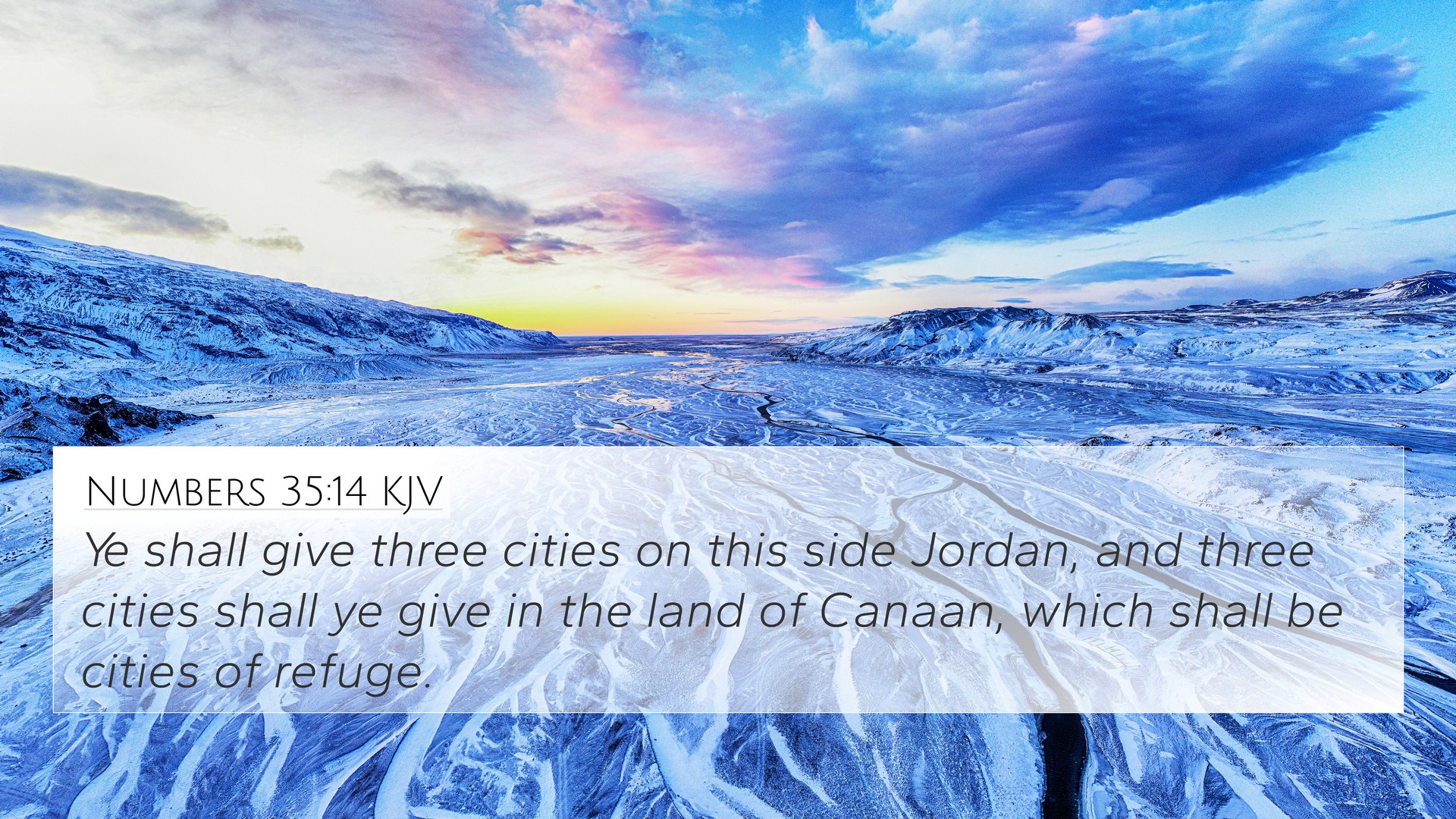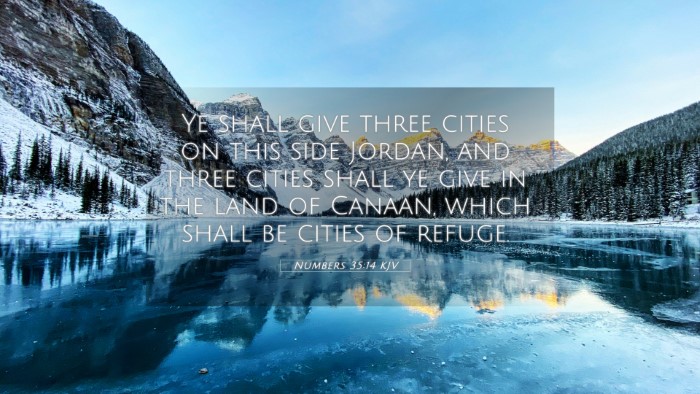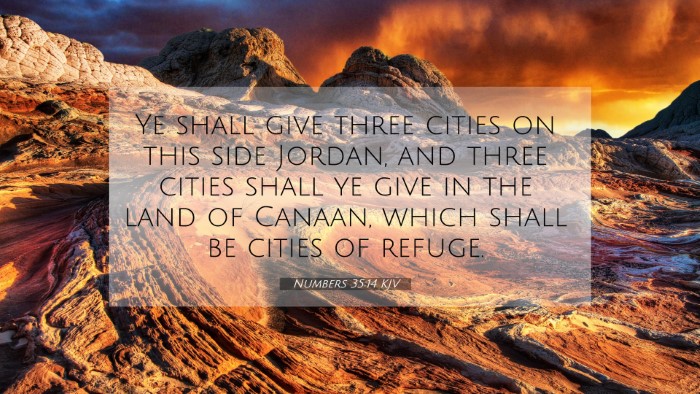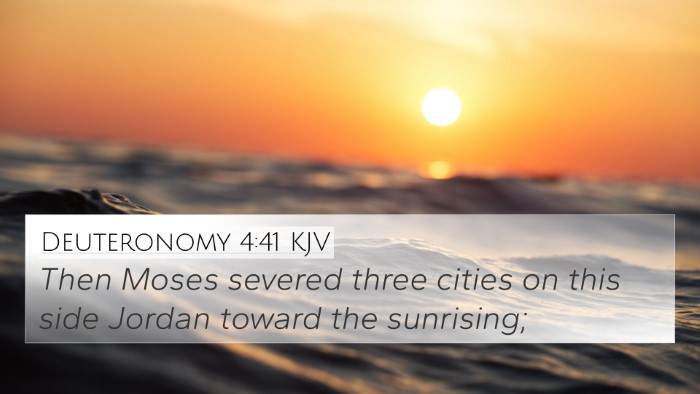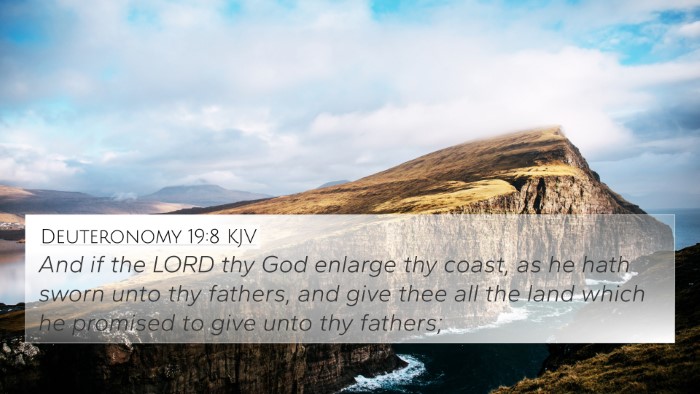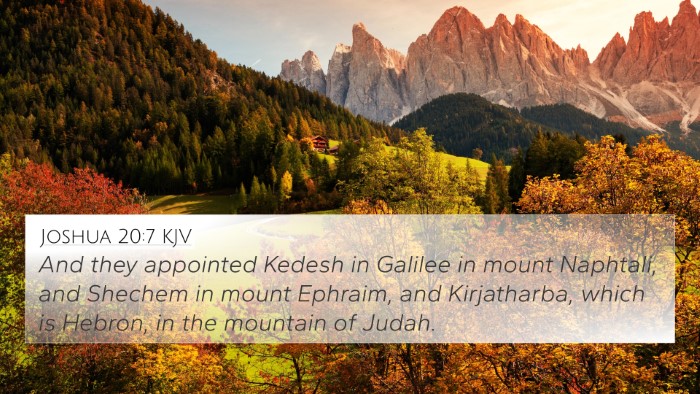Understanding Numbers 35:14
Numbers 35:14 states, "You shall give three cities across the Jordan and three cities in the land of Canaan, which will be cities of refuge."
Summary and Interpretation
This verse is part of God's instructions to Moses regarding the cities of refuge for those who unintentionally commit manslaughter. It underscores God's provision for mercy and justice.
Key Insights from Public Domain Commentaries
-
Matthew Henry: Henry emphasizes that these cities represent God's mercy and highlight His desire to ensure justice without partiality. They serve as a sanctuary for the innocent, illustrating a key principle of divine justice where intentional murder is distinguished from unintentional acts.
-
Albert Barnes: Barnes notes that the allocation of cities both across the Jordan and in Canaan reflects a comprehensive approach to ensure accessibility for all Israelites. This division indicates that God ensured no one would be left without recourse in unfortunate circumstances.
-
Adam Clarke: Clarke comments on the significance of the cities of refuge as a symbol of Christ's salvation. Just as those accused of unintentional killing could find safety, so too can believers find refuge in Christ from the penalty of sin.
Connections between Bible Verses
The concept of cities of refuge in Numbers 35:14 connects with several other passages in the Bible, reinforcing themes of mercy, safety, and divine justice. Here are some relevant cross-references:
- Deuteronomy 19:1-13: Details the laws regarding cities of refuge and describes their purpose and protection for the innocent.
- Joshua 20:7-9: Reiterates the allocation of cities of refuge by Joshua, highlighting God's continuous provision.
- Exodus 21:12-14: Discusses the distinction between accidental and intentional killing, setting a foundation for the need for refuge cities.
- 1 Chronicles 6:57: Lists the Levitical cities, including refuge cities, emphasizing their special status among Israelite cities.
- Psalms 46:1: Defines God as a "refuge and strength," drawing a parallel to the physical refuge represented by the cities.
- Hebrews 6:18-20: Presents Christ as our ultimate refuge, akin to the cities of refuge, where believers can flee for safety.
- Romans 3:25: Discusses Christ being put forward as a propitiation through faith, akin to seeking refuge.
- Luke 23:34: Jesus' words for forgiveness echo the spirit of mercy that underlies the cities of refuge.
Thematic Bible Verse Connections
To explore the themes presented in Numbers 35:14, one might consider the broader narrative surrounding refuge, justice, and grace throughout Scripture:
-
Refuge: The consistent theme of God providing safe havens for His people can be seen in Psalms 91:2, affirming the Lord as a refuge and fortress.
-
Justice: The principle of justice is echoed in Micah 6:8, where God calls His people to act justly, love mercy, and walk humbly with Him.
-
Grace: The New Testament expands on the idea of grace and mercy found in instances such as John 3:17, where Jesus came not to condemn but to save.
Cross-Referencing Biblical Texts
Engaging in cross-referencing helps illuminate the interconnectedness of scriptural teachings. Here are some methods to explore these connections:
-
Utilize a Bible Concordance: A concordance allows users to search for similar terms or concepts across various Bible passages, facilitating thematic studies.
-
Bible Cross-Reference System: Many study Bibles and tools provide built-in cross-references, making it easier to explore connections.
-
Comparative Studies: Draw parallels between Old and New Testament teachings, such as comparing the cities of refuge to the concept of spiritual refuge in Christ.
Conclusion
Numbers 35:14 not only serves as a historical directive concerning the cities of refuge but also carries profound implications for understanding divine mercy, justice, and safety in Christ. By cross-referencing, one can uncover the depths of Biblical themes and enhance the understanding of scripture as a cohesive narrative.
